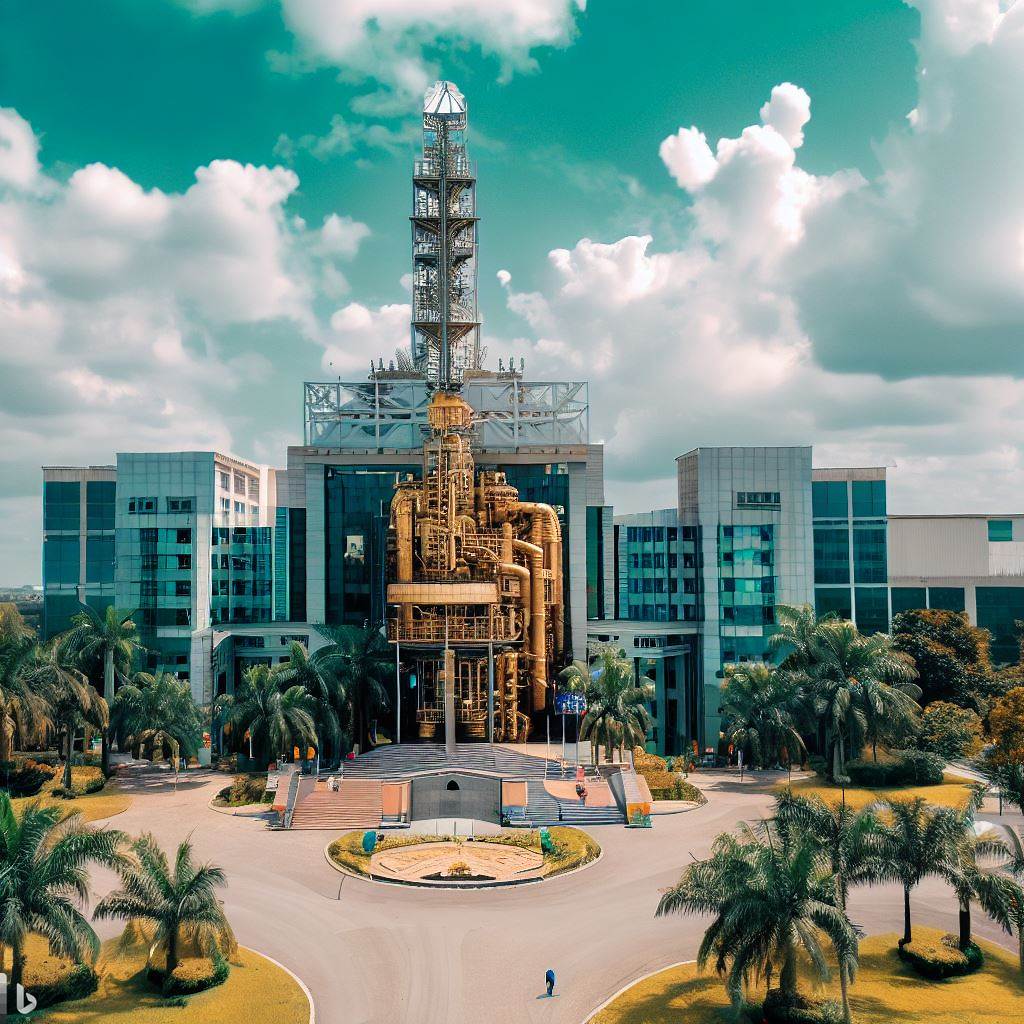Introduction
Petroleum engineering is the field that involves the exploration, extraction, and production of oil and gas resources.
Nigeria’s energy sector is of great importance to the country’s economy and development.
Petroleum engineers play a significant role in ensuring the smooth functioning of Nigeria’s energy sector.
Definition of petroleum engineering:
Petroleum engineering is the branch of engineering that deals with the processes involved in extracting and processing crude oil and natural gas.
Importance of Nigeria’s energy sector:
Nigeria, being the largest oil producer in Africa, heavily relies on its energy sector for economic growth and revenue generation.
Significance of petroleum engineers in Nigeria’s energy sector:
Petroleum engineers in Nigeria’s energy sector contribute to the exploration and production of oil and gas resources, ensuring a steady supply of energy for the country.
They are responsible for designing and implementing efficient extraction methods, maximizing production levels, and maintaining the safety and environmental standards.
Petroleum engineers also play a vital role in reservoir management, including conducting reservoir modeling and simulation, evaluating reserves, and analyzing production data.
They use advanced technologies and models to optimize extraction and enhance recovery rates.
Moreover, petroleum engineers collaborate with other professionals in the energy industry, such as geologists and geoscientists, to identify potential reserves and plan exploration activities.
Their expertise is crucial in making informed decisions regarding drilling locations, well designs, and production strategies.
All in all, petroleum engineers are essential in Nigeria’s energy sector.
They contribute to the overall development of the country by ensuring a reliable supply of oil and gas resources and maximizing production efficiency.
Their knowledge and skills play a crucial role in sustaining Nigeria’s energy industry and driving economic growth.
In this blog post, we will discuss the role of petroleum engineers in Nigeria’s energy sector.
Specifically, we will provide an overview of Nigeria’s energy sector by examining its dependency on petroleum resources, the current state of the sector, and future projections and challenges.
Overview of Nigeria’s Energy Sector
Dependency on Petroleum Resources
Nigeria heavily relies on petroleum resources as a major source of energy.
The country is one of the largest oil producers in Africa and the world.
Oil exports contribute significantly to Nigeria’s revenue and foreign exchange earnings.
Petroleum products meet the majority of energy demand in the country.
Current State of Nigeria’s Energy Sector
Nigeria’s energy sector is characterized by a mix of challenges and opportunities.
The sector has faced issues such as inadequate infrastructure and outdated technologies.
Inefficiencies in the energy supply chain have led to frequent power outages.
However, recent reforms and investments have shown improvements in the sector.
Future Projections and Challenges
The Nigerian government aims to diversify its energy sources beyond petroleum.
Renewable energy technologies, such as solar and wind, are being promoted.
Petroleum engineers play a vital role in transitioning towards a more diverse energy sector.
Challenges include limited funding, technological barriers, and policy implementation.
Developing local capacity and expertise in renewable energy is crucial for sustainable growth.
Petroleum engineers need to adapt their skills and knowledge to new energy technologies.
Collaboration between the government, private sector, and academia is essential for success.
Investments in research and development are necessary to overcome challenges and harness opportunities.
In the end, petroleum engineers in Nigeria’s energy sector have a pivotal role in driving the country’s energy transition.
Nigeria’s heavy reliance on petroleum resources necessitates the expertise and innovation of these engineers to ensure sustainable energy supply.
Despite challenges, the government’s commitment to diversify the sector provides opportunities for petroleum engineers to contribute to Nigeria’s energy future.
Through collaboration and investment, Nigeria can overcome challenges and harness the potential of renewable energy sources.
Petroleum engineers must adapt their skills and knowledge to embrace these changes and be at the forefront of Nigeria’s evolving energy landscape.
Read: Challenges Faced by Petroleum Engineers in Nigeria
Role of Petroleum Engineers in Nigeria’s Energy Sector
Exploration and Production of Petroleum Resources
Petroleum engineers in Nigeria’s energy sector are at the forefront of the exploration and production of vital petroleum resources.
Their responsibilities encompass a series of crucial tasks:
Geophysical and Geological Assessment
Conducting meticulous geological and geophysical surveys forms the bedrock of their work.
These surveys are conducted to accurately evaluate the potential oil and gas reserves within a designated area.
Precision Drilling Site Selection
Leveraging data collected from surveys, engineers identify optimal drilling sites.
This selection process is intricate, as it hinges on data-driven insights to enhance success rates.
Efficient Extraction Methods
Engineers meticulously design advanced drilling and extraction methodologies to ensure the efficient recovery of petroleum resources.
Factors like reservoir depth and rock formations are meticulously considered.
Reservoir Characterization and Management
Reservoir Analysis
Petroleum engineers delve into detailed reservoir analysis to comprehend its composition and behavior.
This knowledge underpins effective decision-making.
Resource Evaluation
They accurately estimate recoverable oil and gas reserves, providing crucial data for informed production projections.
Enhanced Recovery Techniques
Ingenious enhanced oil recovery methods are developed, boosting the extraction of hydrocarbons and optimizing resource utilization.
Development and Optimization of Drilling Operations
Strategic Project Planning
Engineers spearhead the planning and coordination of drilling endeavors, meticulously considering parameters such as cost and time.
Technological Advancements
By embracing cutting-edge drilling technologies, engineers elevate drilling efficiency and precision, consequently enhancing operational outcomes.
Well Productivity Enhancement
Through innovative practices and equipment utilization, petroleum engineers drive heightened well productivity and efficiency.
Environmental Sustainability and Safety
Regulatory Compliance
Engineers ensure unwavering adherence to environmental regulations, thus curtailing adverse operational effects.
Safety Implementation
Safety protocols are rigorously enforced to safeguard both personnel and the environment throughout all operational phases.
Mitigation Measures
Addressing environmental concerns is paramount.
Engineers proactively develop and implement mitigation strategies, covering waste management and emission reduction.
In a nutshell, petroleum engineers are pivotal in Nigeria’s energy sector, encompassing multifaceted roles vital for resource exploration, extraction optimization, and environmental stewardship.
Their proficiency significantly bolsters Nigeria’s efficient oil and gas production, ensuring a sustainable energy future.
Read: Petroleum Engineering Salary Scales in Nigeria: An Insight

Contributions of Petroleum Engineers in Nigeria’s Energy Sector
Increased oil production and reserves
Petroleum engineers play a crucial role in helping Nigeria increase its oil production.
They use their expertise to optimize extraction techniques and improve the overall efficiency of drilling operations.
By implementing innovative technologies, petroleum engineers contribute to the discovery of new oil reserves.
Through their efforts, Nigeria can maintain and expand its position as a leading oil-producing country.
Development of indigenous expertise
Petroleum engineers in Nigeria work towards developing local talent and expertise in the energy sector.
They collaborate with universities and research institutions to educate and train aspiring engineers.
By nurturing indigenous talent, they ensure that Nigeria has a pool of skilled professionals to support its energy needs.
This development of local expertise also reduces dependency on foreign professionals and increases national self-reliance.
Technological advancements and innovation
Petroleum engineers in Nigeria are at the forefront of technological advancements and innovation in the energy sector.
They continuously explore and adopt new technologies to enhance exploration and production processes.
Through their research and development efforts, they find better ways to extract oil, improve safety measures, and reduce environmental impacts.
These technological advancements help Nigeria stay competitive in the global energy market.
Read: Universities Offering Robotics Engineering in Nigeria
Economic growth and foreign investments
The work of petroleum engineers contributes significantly to Nigeria’s economic growth and attracts foreign investments.
Increased oil production leads to higher revenue for the country, which can be invested in infrastructure and social development.
The presence of skilled petroleum engineers enhances Nigeria’s reputation as a reliable and attractive destination for foreign investors.
The energy sector, driven by petroleum engineers, creates employment opportunities and drives economic prosperity.
In short, petroleum engineers play a vital role in Nigeria’s energy sector.
Through their contributions, they help increase oil production and reserves, develop indigenous expertise, drive technological advancements, and stimulate economic growth.
Their work is essential in ensuring Nigeria’s energy security, sustainability, and competitiveness in the global market.
Nigeria’s petroleum engineers are at the forefront of innovation, driving the country towards a brighter energy future.
Read: A Day in the Life of a Nigerian Petroleum Engineer
Learn More: Nigeria’s Chemical Engineering: Education and Certification
Challenges and Opportunities for Petroleum Engineers in Nigeria’s Energy Sector
Aging infrastructure and equipment
Nigeria’s energy sector faces the challenge of aging infrastructure and outdated equipment.
Petroleum engineers are responsible for identifying and addressing issues related to aging infrastructure.
Challenges include frequent breakdowns, maintenance costs, and the need for equipment replacement.
Petroleum engineers have the opportunity to develop innovative solutions and modernize the energy sector.
Publish Your Professional Profile, Business or Brand
Showcase your expertise, gain trust, and boost visibility instantly on Professions.ng.
Publish NowUpgrading infrastructure and equipment will improve operational efficiency and reduce downtime.
Skills gap and the need for continuous education
The energy sector in Nigeria requires petroleum engineers with diverse skills and up-to-date knowledge.
A skills gap exists due to the rapid advancement in technology and changes in industry practices.
Continuous education and training programs are essential for petroleum engineers to bridge this gap.
Opportunities for continuous education include workshops, conferences, and industry certifications.
Keeping up with emerging technologies and industry trends enhances the career prospects of petroleum engineers.
Energy transition and renewable energy prospects
Global efforts to transition towards renewable sources of energy impact Nigeria’s energy sector.
Petroleum engineers need to adapt their skills and knowledge to integrate renewable energy solutions.
The demand for petroleum engineers with expertise in renewable energy technologies, such as solar and wind, is increasing.
Opportunities arise for petroleum engineers to contribute to the development and implementation of renewable energy projects.
Collaboration between petroleum engineers and professionals from renewable energy sectors is crucial for a successful transition.
International competition and market dynamics
Nigeria’s energy sector faces intense international competition and market dynamics.
Petroleum engineers must stay updated on global trends and advancements to remain competitive.
Competing for international contracts requires petroleum engineers to demonstrate their expertise and industry knowledge.
Opportunities arise for petroleum engineers to work on international projects and gain exposure to diverse markets.
Staying abreast of global market dynamics allows petroleum engineers to seize opportunities and drive growth in Nigeria’s energy sector.
In fact, petroleum engineers in Nigeria’s energy sector face challenges related to aging infrastructure, skills gaps, energy transition, and international competition.
However, these challenges also present opportunities for petroleum engineers to innovate, continuously educate themselves, contribute to renewable energy prospects, and expand their reach in international markets.
By embracing these challenges and seizing opportunities, petroleum engineers can help drive the growth and advancement of Nigeria’s energy sector.
Read: Prospects of the Petroleum Engineering Field in Nigeria
Conclusion
Recap of the role of petroleum engineers in Nigeria’s energy sector
Petroleum engineers play a crucial role in the exploration, extraction, and production of oil and gas in Nigeria.
They are responsible for designing and implementing efficient processes to extract petroleum resources.
Importance of supporting and investing in the profession
Supporting and investing in petroleum engineering is vital for Nigeria’s energy sector.
It ensures the availability of skilled professionals and promotes technological advancements, leading to increased production and revenue.
Potential for future growth and development in the industry
With Nigeria being one of the largest oil-producing countries in Africa, there is immense potential for growth and development in the petroleum industry.
Investing in research and development can lead to new discoveries, improved extraction techniques, and sustainable practices.
In summary, petroleum engineers are indispensable in Nigeria’s energy sector.
Their expertise in harnessing petroleum resources, coupled with support and investment in the profession, will contribute to the industry’s growth and development.
Nigeria has the opportunity to become a leader in the global energy market by nurturing and empowering its petroleum engineers.




